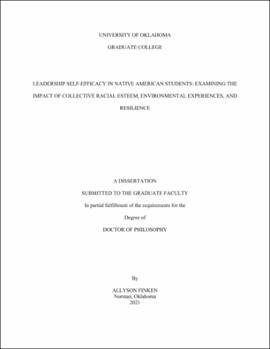| dc.contributor.advisor | Snyder, Lori | |
| dc.contributor.author | Finken, Allyson | |
| dc.date.accessioned | 2021-06-25T19:13:07Z | |
| dc.date.available | 2021-06-25T19:13:07Z | |
| dc.date.issued | 2021-06 | |
| dc.identifier.uri | https://hdl.handle.net/11244/330093 | |
| dc.description.abstract | This paper utilizes a structural equation modeling approach to explore the relationship between collective racial esteem, discriminatory campus climate, sociocultural conversations with peers, resilience, and leadership self-efficacy for Native American students. As a result of the 500 years of colonization, Native American communities identify resilience as one of their core values and promote leadership development as a mechanism to advance their communities. Survey results revealed that for Native American students, discriminatory campus climate has a significant, negative relationship with resilience, and resilience has a significant, positive relationship with leadership self-efficacy. White and Asian students were also surveyed to act as a control and comparison group. Results revealed that a discriminatory campus climate was only detrimental to leadership development for Native American students. Implications and recommendations for improving campus climate to promote leadership development in Native American students are discussed. | en_US |
| dc.language | en | en_US |
| dc.subject | Native American Studies. | en_US |
| dc.subject | Leadership | en_US |
| dc.subject | Psychology, Organizational | en_US |
| dc.title | Leadership self-efficacy in Native American students: examining the impact of collective racial esteem, environmental experiences, and resilience | en_US |
| dc.contributor.committeeMember | Connelly, Shane | |
| dc.contributor.committeeMember | Song, Hairong | |
| dc.contributor.committeeMember | Beutel, Ann | |
| dc.contributor.committeeMember | Youngbull, Natalie | |
| dc.date.manuscript | 2021-06-25 | |
| dc.thesis.degree | Ph.D. | en_US |
| ou.group | College of Arts and Sciences::Department of Psychology | en_US |
